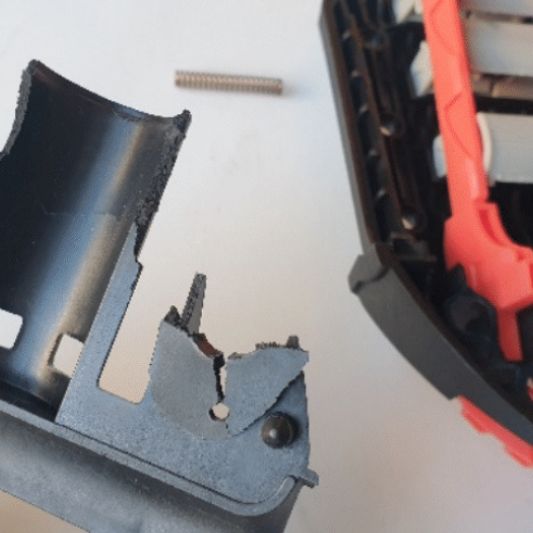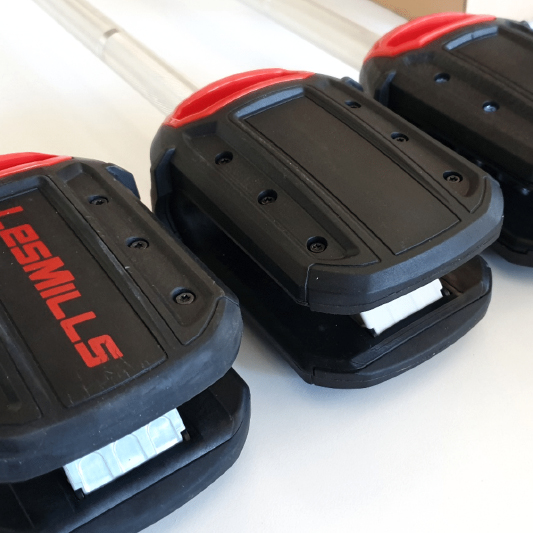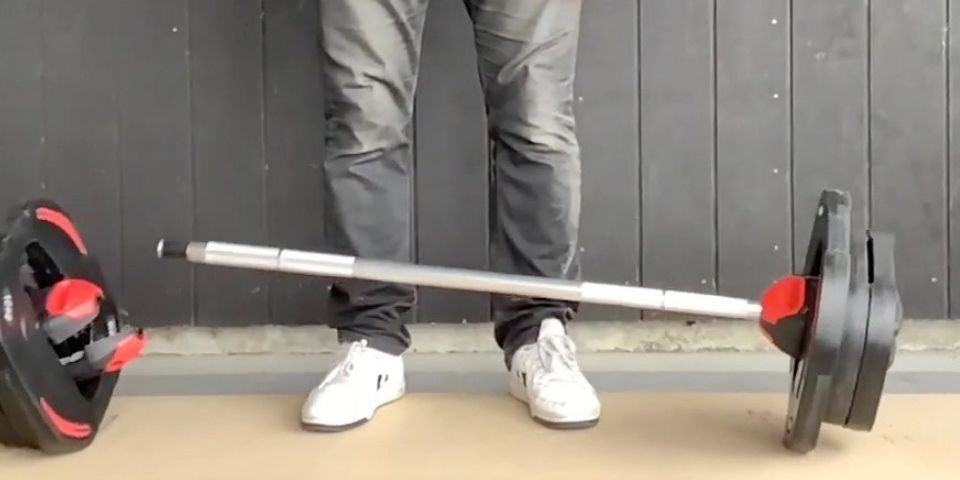Bạn có biết rằng, các dụng cụ tập luyện không chính hãng, như các sản phẩm “nhái” thương hiệu SMART TECH, có thể:
- Gây chấn thương cho học viên của bạn
- Tổn hại hoạt động kinh doanh của bạn
- Tốn kém hơn xét về tương lai lâu dài?
Sản phẩm không chính hãng là những mặt hàng “nhái” kém chất lượng của sản phẩm chính hãng. Chúng có thể có bề ngoài giống hàng gốc, những chắc chắc không thể có tính bến bỉ và an toàn như hàng thật.
Ví dụ, một sản phẩm LES MILLS SMARTBAR™ chính hãng phải vượt qua bài kiểm định khả năng chống chịu 80,000 lần thả rơi mà không mắc bất cứ lỗi vận hành hay hư hỏng bề ngoài nào rồi mới được đánh giá là an toàn. Hàng giả được sản xuất từ các vật liệu kém chất lượng (rẻ tiền) và công thức lắp rắp không chuẩn, và đây là lý do tại sao khi Les Mills tiến hành kiểm định tất cả các thanh tạ “nhái” mà chúng tôi tìm thấy trên thị trường, tất cả đều hư hại về cấu trúc và thất bại về khả năng vận hành.
Mua dụng cụ không chính hãng sẽ gây nên những tổn hại nghiêm trọng đến công việc kinh doanh cũng như học viên của bạn.
Ben Main sẽ giải thích về sự khác nhau giữa sản phẩm gốc so với “nhái”


Một từ - An Toàn. Những thanh tạ “nhái” không chỉ đơn giản là sao chép sản phẩm gốc. Chúng không được sản xuất từ cùng một nhà máy và chắc chắn không được làm từ cùng loại chất liệu. Chúng không phù hợp với mục tiêu sử dụng và nguy hiểm cho những động tác như nâng tạ.
Với những lý do đảm bảo an toàn, chúng tôi khyến khích người tập luyện sử dụng các sản phẩm đúng nguồn gốc từ bất cứ nhà sản xuất hợp pháp nào, thay vì sử dụng hàng giả.
Những điểm khác biệt hoàn toàn nằm ở điều bạn không thấy. Nhìn bề ngoài, hàng gốc và nhái thường nhìn giống nhau một cách bất ngờ, nhưng tính an toàn chính là sự khác biệt khi chúng được sử dụng để tập luyện.
Ví dụ, sản phẩm LES MILLS SMARTBAR™ chính hãng được thiết kế và sản xuất để vượt qua được bài test thả rơi 80,000 lần mà không bị lỗi vận hành hoặc hư vỡ bề ngoài trước khi được đánh giá là đạt yêu cầu.
Chúng tôi đã tiến hành kiểm tra tất cả các thanh tạ “nhái” với quy trình tương tự được sử dụng cho sản phẩm SMARTBAR gốc. Không sản phẩm nào có thể “sống sót” qua một lần thả rơi mà không bị thiệt hại về cấu trúc, hoặc khả năng vận hành. Lý do vì các sản phẩm đó đều được làm từ các vật liệu kém chất lượng (giá thành rẻ) và công thức lắp ráp không chuẩn xác.
Quy trình kiểm định cho một SMARTBAR chính hãng bao gồm một chuỗi các tác động mô phỏng một vòng đời điển hình của một sản phẩm, điều này tương đương với việc chúng phải chịu được 80,000 lần thả rơi. Qua kiểm định riêng biệt, các thanh tạ “nhái” trở nên không an toàn ngay sau lần thả rơi đầu tiên( click to watch video), khi rơi từ độ cao 0.5 mét với lượng tạ trung bình (không phải lượng tạ tối đa mà SMARTBAR chứng minh có thể chịu được). Rất rõ ràng để có thể thấy ngay được rằng các sản phẩm “nhái” được sản xuất với vật liệu với chất lượng thấp và không đạt được sự bền bỉ như SMARTBAR. Phần nhựa được sử dụng trong sản phẩm “nhái” có chất lượng thấp và thường thiếu đi những tính năng trọng yếu tạo sức bền cho sản phẩm. Phần bên trong đầu thanh tạ của một số hàng giả không chắc chắn, tạo áp lực lớn khi lắp tạ, khiến thanh tạ bị gãy.
với một lần thả rơi, cấu trúc phần đầu của thanh tạ “nhái” đã hư hỏng nặng, lúc này thanh tạ đã không còn an toàn để sử dụng tiếp. Thả rơi lần hai, thanh tạ bị huỷ hoại hoàn toàn (click to watch video) bởi đầu thanh đã vỡ khỏi thanh tạ, dẫn đến khả năng gây chấn thương nghiêm trọng cho người sử dụng.
- Không giống như mua một chiếc túi xách giả. Một thanh tạ “nhái” sẽ tăng khả năng chấn thương và hư hỏng bởi chúng thường được sản xuất với vật liệu kém chất lượng.
- Mặc dù ban đầu giá sản phẩm thấp hơn so với hàng chính hãng, nhưng thay vào đó vòng đời sản phẩm “nhái”sẽ ngắn và bạn sẽ phải thay thế nó nhiều lần. Kể cả khi thanh tạ “nhái” không bao giờ bị rơi trong quá trình sử dụng thông thường, với sức bền kém, chúng sẽ nhanh hỏng.
- Những sản phẩm có độ bền cao như SMARTBAR gốc ít ảnh hưởng tiêu cực tới môi trường hơn đồ nhái. Việc phân hủy những thanh tạ hỏng bị bỏ đi từ hàng nhái là rất khó, từ đó dẫn tới việc tăng lượng chất thải ô nhiễm ra môi trường.
Les Mills đảm bảo ba năm sử dụng cho tất cả các sản phẩm SMARTBAR. Trong quá trình phát triển SMARTBAR, Les Mills đã tạo nên một quá trình kiểm định chất lượng dựa trên một vòng đời điển hình mà một thanh tạ trải qua trong các lớp fitness của một phòng gym.
Như một phần của việc phát triển sản phẩm .Trước khi được đánh giá là an toàn, SMARTBAR bắt buộc phải vượt qua tất cả những bài test đó mà không mắc lỗi vận hành hay hư hỏng bên ngoài. SMARTBAR đạt tiêu chuẩn cao về độ an toàn – sự “tương tự” này không thể nào tìm được ở các sản phẩm “nhái”.
SMARTBAR là kết tinh của nhiều năm nghiên cứu và phát triển, với hàng triệu đô chi trả cho việc đầu tư trên . Chúng tôi hiểu đến từng chi tiết nhỏ sản phẩm của chúng tôi và nhu cầu sử dụng của khách hàng. Từng quyết định đưa ra trong thiết kế sản phẩm của SMARTBAR đều dựa trên feedback của người sử dụng, quy trình kiểm định và tham vọng tạo ra một sản phẩm tốt nhất mà chúng tôi có thể. Từng yếu tố có trong sản phẩm Les Mills đều được thiết kế và kiểm định để tối đa hiệu suất vận hành và sức bền của chúng. Bất cứ chất liệu nào không đáp ứng được kết quả chúng tôi cần, chúng tôi phát triển chất liệu riêng của mình.
Đa số các sản phẩm nhái SMARTBAR đều không có logo, hoặc logo với chữ cái E trong LES MILLS thay bằng số 6 (L6SMILLS). Phần đầu của SMARTBAR nhái thường sẽ giống như “Miệng Cá Sấu” hơn là “ Đầu cá sấu mõm ngắn”. Nếu bạn không chắn chắn, tốt nhất hãy liên hệ với Les Mills Asia Pacific hoặc bất cứ nhà phân phối chính thức nào của chúng tôi trên toàn thế giới.
Les Mills sẽ điều tra bất cứ nhà bán hàng giả/ bất hợp pháp nào và sẽ tiến hành các bước cần thiết để gỡ bỏ các tin rao bán hoặc các kênh bán hàng đó. Vui lòng thông báo bất cứ trường hợp nghi vấn nào tại www.lesmills.com/piracy-report
